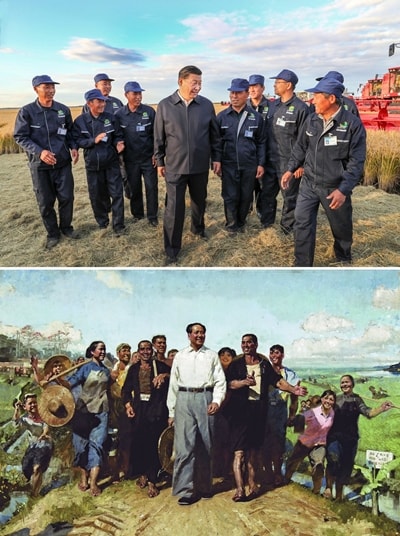Xi Jinping's inspection trip aims to send a message to the US
Mr. Tap emphasized the message of "self-reliance" during his inspection tour, calling for increasing domestic products to avoid dependence on foreign countries.
 |
| Similarities between photos of Xi Jinping inspecting northeastern China this month and propaganda posters depicting Mao Zedong with farmers in the 1950s. Photo: Xinhua/UIG. |
While Trump attacked China at the United Nations in New York this week, Chinese President Xi Jinping made a three-day inspection tour of the country's northeast.
A photo from a farm visit in Heilongjiang province shows Xi walking forward as farmers stand around him, smiling, against a blue sky. The image is reminiscent of a 1950s propaganda poster depicting former Chinese leader Mao Zedong and farmers.
Mao Zedong was a master of propaganda in rural areas. He used images and songs to highlight his concerns for workers, according toNYTimes.
Pang Laikwan, a professor at the Chinese University of Hong Kong, believes Xi Jinping learned his populist appeal from Mao Zedong. "Mao had a genuine interest in communicating with ordinary people. That was part of his charisma," she said.
David Bandurski, co-director of the China Media Project, a research program affiliated with the University of Hong Kong, pointed out that Mr. Xi added modern touches to the rural image, with a series of combine harvesters in the background of the photo meant to show off China's technological advances.
During his visit, Mr. Xi chatted with a worker at an equipment factory in Qiqihar. “Are these raw materials produced domestically?” he asked. “Yes, they are all domestic,” the worker replied.
Mr. Xi used the inspection trip to reiterate calls for China to move faster in building its own technologies to become less dependent on the United States.
As trade tensions between the two countries have grown and threatened supply chains, Mr. Xi has frequently urged China to develop its own microchips, software and other technologies — part of its strategy to become the leading 21st-century superpower.
The Chinese president stressed "self-reliance." He picked up a rice bowl and said, "Chinese rice, Chinese bowl."
“The renaissance of the Chinese nation depends on our economic competitiveness,” Mr. Xi said, using a phrase often used to describe China’s rise. “Only then can China remain invincible.”
Writer Glenda Korporaal commented onAustralianthat Mr. Xi's inspection trip was designed to show "a calm and caring leader at a time when the country is under a series of attacks from the United States."
The US escalated the trade war this week by imposing tariffs on $200 billion worth of Chinese goods, prompting Beijing to retaliate by imposing tariffs on $60 billion worth of US goods.
The two countries have previously imposed tariffs of $50 billion on each other. The US accuses China of stealing intellectual property, restricting market access for US companies, and unfairly subsidizing state-owned enterprises. The US wants to pressure Beijing to change.
However, China still refuses to give in, even though it is running out of options to respond, because the amount of goods it imports from the US is much less than the amount of goods it exports to it.
At the United Nations Security Council meeting, Trump also accused China of interfering in the US midterm elections in November with the intention of undermining his Republican Party.
Trump also said his friendship with Xi Jinping could end. Chinese Foreign Minister Wang Yi, who represented China at the UN meeting, denied allegations of election interference.
"As China enters Golden Week (a week-long holiday for National Day) next week, it may be hoping Washington will tone down its political attacks. However, as relations between the two sides worsen, the two are now locked in a protracted battle," Korporaal wrote.

